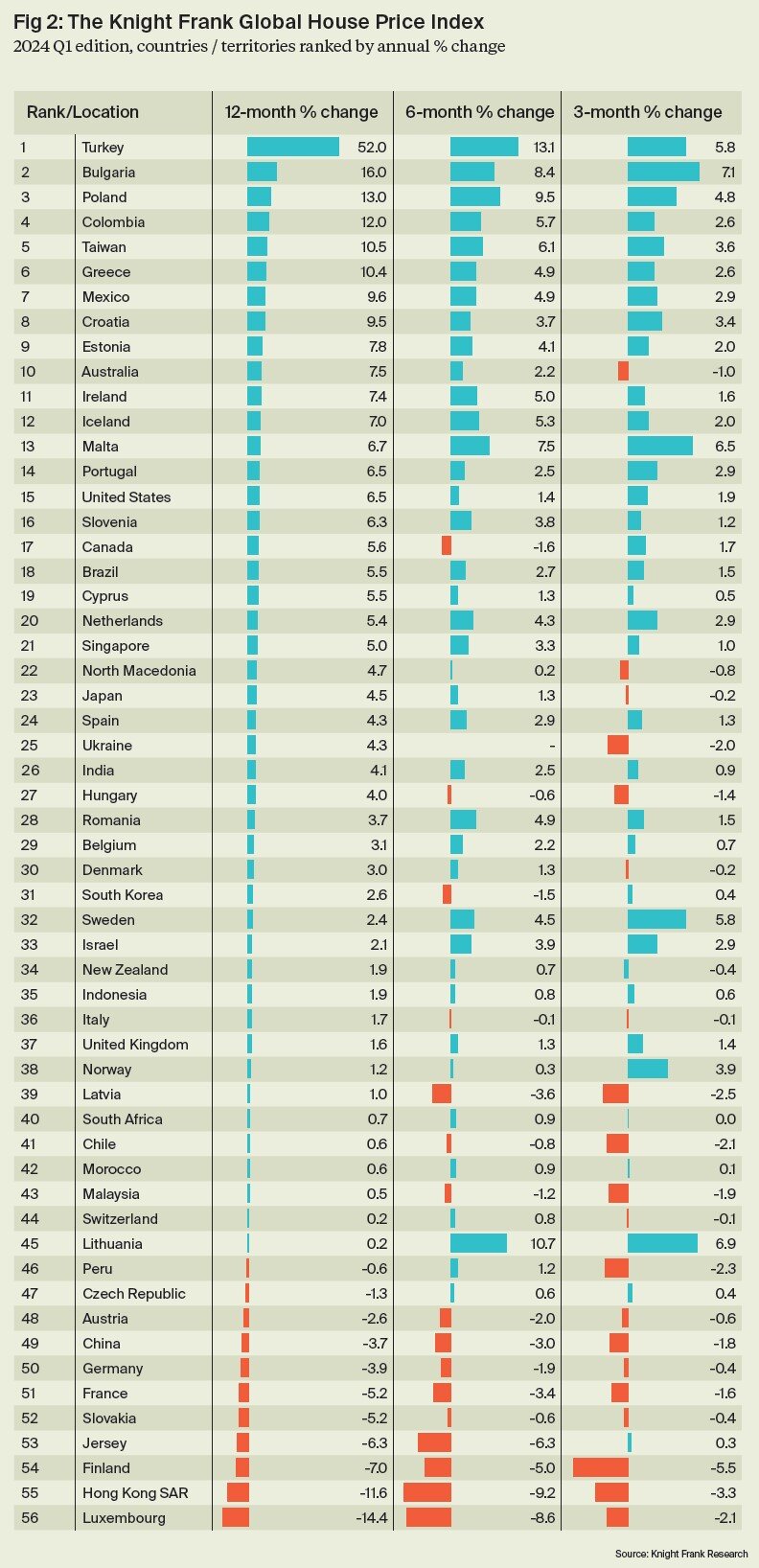Residential Real Estate News

Global Home Price Growth Accelerates in 2024
Residential News » Istanbul Edition | By Michael Gerrity | July 12, 2024 11:01 AM ET
Based on new data from Knight Frank, global housing markets continued to see stronger growth in the first quarter of 2024, with annual growth across the 56 markets we cover reaching 3.6%. This marks a notable improvement from the 2.2% growth seen in Q2 last year when markets were absorbing the impact of the rapid worldwide rise in interest rates since early 2022.
Although prices are rising at an annual rate of 3.6%, this is still below the 20-year long-run trend rate of 5.6%. Quarterly growth, though more volatile, is running at 1.3%. This is an increase from the past two quarters but still marginally below the long-run average of 1.4%.
Looking across 56 markets, 82% are posting annual price growth in Q1--the strongest showing since Q4 2022. On a quarterly basis, 67% of markets are seeing prices rise--the strongest since Q3 2022.
With inflation still elevated in many global markets, real house price growth remains negative. When accounting for inflation, prices fell on average by 0.4% in the 12 months leading up to March this year. Real annual price growth is currently 3.3% below its long-run average of 2.9%.
COUNTRY FOCUS
Turkey leads Knight Frank's index once again, with significant domestic inflation impacting the housing market. After peaking at 86% in October 2022, CPI in Turkey fell to a low of 38% in June last year but has since surged again to 75%. While rising by over 50% in the year to March, in real terms, prices in Turkey have fallen by 9.9% over the past 12 months.
Bulgaria (16%), Poland (13%), Colombia (12%), Taiwan (10.5%), and Greece (10.4%) are the other markets seeing double-digit growth.
The Australian market, with 7.5% growth over the past 12 months, has seen a strong turnaround since last year when prices were under pressure from rising rates. However, prices fell by 1% in the last three-month period.
The U.S. saw strong growth at 6.5%, with prices ticking up by 1.9% over the past quarter, supported by low stock even as debt costs weigh on the market.
The UK's 1.6% growth in Q1 marks a continued slowing of growth, as high debt costs conspire to squeeze affordability.

European markets comprise eight of the 11 markets experiencing price falls, with France (-5.2%) and Germany (-3.9%) feeling the effects of slower economic growth and high recent inflation.
Hong Kong lags behind other key global markets, with a fall of 11.6% in prices over the past 12 months. A slower economy has led to a repricing of the market.
Liam Bailey, Knight Frank's global head of research says, "House prices have ticked up over the past year in the majority of global markets. Many markets are suffering from a lack of properties to sell as well as slow new-build delivery, leading to relatively healthy demand pushing prices to new highs. In the longer term, however, only lower debt costs will sustain price growth."

Sign Up Free | The WPJ Weekly Newsletter
Relevant real estate news.
Actionable market intelligence.
Right to your inbox every week.
Real Estate Listings Showcase
Related News Stories
Residential Real Estate Headlines
- U.S. New-Home Sales Surge in August as Mortgage Rates Ease
- Despite Increased Foreign Buyer Activity, Miami Residential Sales Dip 11 Percent in August
- California Home Sales Enjoy Modest Uptick as Mortgage Rates Ease
- U.S. Home-Flipping Profits Sink to Lowest Level Since 2008 Financial Crisis as Costs Climb
- Why the World's Rich Are Flocking to Europe in 2025
- Federal Reserve Delivers First Rate Cut of 2025 as Mortgage Relief Proves Limited
- Homebuilder Sentiment Holds Steady in U.S. as Rate-Cut Bets Lift Outlook
- U.S. Mortgage Rates Experience Sharpest Weekly Drop in Over a Year
- U.S. Foreclosures Rise for Sixth Straight Month as Affordability Pressures Mount
- Black U.S. Homeownership Rate Falls to Two-Year Low as Job Losses Mount
- Las Vegas Home Prices Flatten as Listings Surge, Sales Slow
- Cooling Miami Housing Market Sees 16 Percent Annual Sales Drop in July
- U.S. Mortgage Delinquencies Uptick in June Amid Regional Pressures
- California, Florida Top U.S. Housing Markets Most at Risk of Downturn
- 30-Year Mortgage Drops to 6.56 Percent in Late August, Lowest Since October 2024
- Investors Maintain Elevated Role in U.S. Housing Market Despite Slight Pullback
- Pending Home Sales Show Mixed Signals as U.S. Buyers Remain Cautious
- Canadian Home Sales Extend Recovery in July
- U.S. Home Sales Rise in July as Buyers Gain More Bargaining Power
- Zombie Foreclosures Edge Up Across U.S.
- 2.6 Million Homes at Wildfire Risk Across 14 Western States in 2025
- One in Five Americans Willing to Trade Personal Safety for Home Affordability
- U.S. Home Price Growth Slows as Affordability Pressures Mount in 2025
- U.S. Mortgage Rates Dip to Four Month Low in Early August
- U.S. Mortgage Applications Rise in Late July, Breaking Four-Week Slump
- Hong Kong's Housing Market Stuck in Stalemate as Bulls and Bears Face Off
- U.S. Condo Market Struggles in 2025
- U.S. Pending Home Sales Remain Sluggish in June
- Los Angeles Area Wildfires Destroyed Nearly $52 Billion in Homes Last January
- Greater Palm Beach Area Residential Sales Slip in June Amid Growing Inventory
- Economic Resilience Lifts U.S. Housing Outlook Going Forward
- New Home Sales Stagnate as Affordability Struggles Continue in America
- U.S. Housing Market Slips in June as Prices Hit New Highs
- Florida, California Continue to Reign Supreme as America's Ultraluxury Housing Markets
- Caribbean Housing Market Evolves into Global Second-Home Hotspot
- U.S. Home Sales See Highest June Cancellation Rate on Record
- Orlando Housing Market Cools in June as Listings Slide, Sales Slow
- Private Credit Surges in 2025 as Real Estate Developers Bypass Banks
- U.S. Condo Market Suffers Sharpest Price Drops in Over a Decade as Buyers Retreat
- Rising Taxes, Insurance Costs Undermine the Stability of U.S. Homeownership







